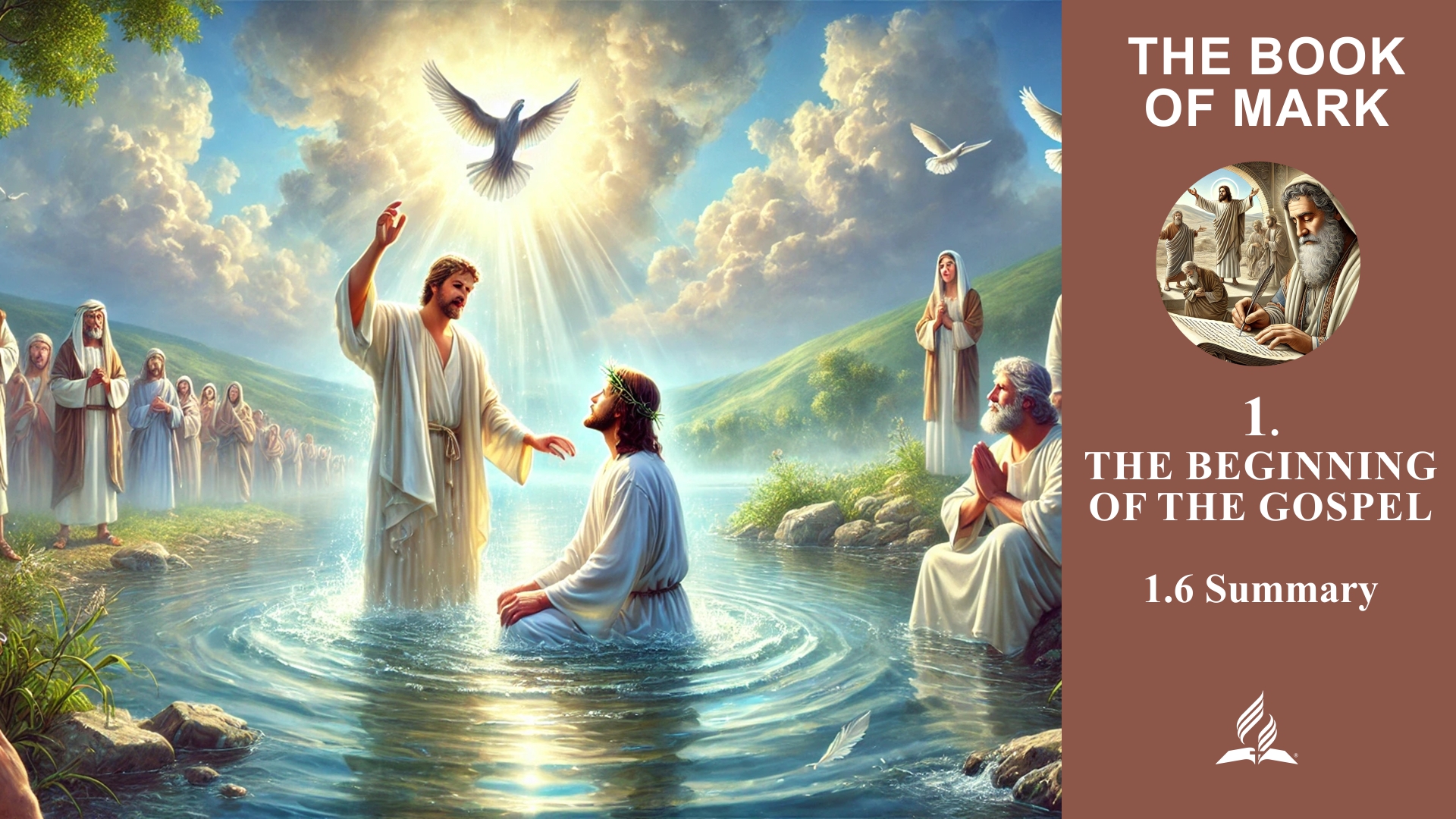


1.6 Summary
Jesus’ Early Ministry
The Failed Missionary
John Mark is introduced as the son of Mary, a wealthy supporter of the early church. Despite his initial failure when he withdrew from Paul and Barnabas’s first missionary journey, John Mark later plays a significant role in the New Testament. Barnabas gives him a second chance, highlighting the power of forgiveness and restoration. This story teaches us that mistakes and setbacks are opportunities for learning and growth, and through grace and support, we can rise again.
A Second Chance
The restoration of John Mark shows the importance of second chances. Despite his failure, Barnabas recognizes the potential in Mark and continues to support him. This leads to Mark later being acknowledged as a valuable co-worker by Paul. This lesson encourages us to be gracious with others and ourselves and to appreciate the transformative power of forgiveness and support.
The Messenger
John the Baptist plays a central role in preparing the way for Jesus. Through his preaching of repentance and his baptism in the Jordan, he prepares people for the coming of the Messiah. John’s life and ministry are examples of dedication, humility, and the call to repentance. This reminds us that we all have a role in God’s plan and that we should point to Jesus through our lives and testimony.
The Baptism of Jesus
Jesus’ baptism in the Jordan marks the beginning of his public ministry and is a significant event where all three persons of the Trinity are present: the Father, the Son, and the Holy Spirit. This scene demonstrates Jesus’ dual nature as fully divine and fully human. The baptism and subsequent temptation in the wilderness emphasize his humility, obedience, and willingness to experience human suffering and temptations. These events encourage us to reflect on our own baptism and to live a life of dedication and trust in God’s guidance.
The Gospel According to Jesus
Jesus’ message is summarized in Mark 1:14-15 and consists of three essential parts: “The time is fulfilled,” “The kingdom of God is near,” and “Repent and believe in the gospel.” This message is based on Old Testament prophecies and emphasizes the fulfillment of time, the nearness of God’s kingdom, and the call to repentance and faith. This message calls us to live our lives in alignment with God’s kingdom, to change our hearts, and to follow Jesus in faith.
Concluding Thoughts
The lesson “The Beginning of the Gospel” shows how God works through people like John Mark and John the Baptist to fulfill His plan of salvation. It emphasizes the importance of forgiveness, preparation, humility, and trust in God’s plan. Jesus’ baptism and his gospel message are central elements that call us to live a life of faith and discipleship. This lesson encourages us to live according to the principles of the gospel in our own lives and to share the love and truth of Jesus with others.
Lesson 1, “The Beginning of the Gospel” from the Gospel of Mark, has deep connections to our daily lives and our faith. These connections can enrich and strengthen our understanding and practice of the Christian faith.
The Lesson “The Beginning of the Gospel”
1.1 The Failed Missionary
-
Life and Faith: The story of John Mark shows us that failure is part of human life. Each of us makes mistakes or experiences setbacks. The way Barnabas gives him a second chance reminds us that forgiveness and restoration are possible. In everyday life, we can learn to be gracious to ourselves and others, learn from our mistakes, and move forward.
1.2 A Second Chance
-
Life and Faith: John Mark receives a second chance from Barnabas, highlighting the importance of supporting people and helping them reach their potential. In our daily lives, this means being patient and forgiving toward others. In faith, this encourages us to trust in God’s forgiveness and to live our lives in the light of His grace.
1.3 The Messenger
-
Life and Faith: John the Baptist calls for repentance and prepares the way for Jesus. This shows the importance of preparation and repentance. In our daily lives, we can learn to regularly reflect on our lives to ensure we are living in accordance with God’s will. In faith, this means being open to the guidance of the Holy Spirit and ready to change our hearts.
1.4 The Baptism of Jesus
-
Life and Faith: Jesus’ baptism shows the confirmation and support of the Trinity and marks the beginning of his ministry. This reminds us of the importance of seeking God’s confirmation in our lives and recognizing His presence. In daily life, we can consciously connect with God through prayer and meditation. In faith, this strengthens our trust in God’s plan and His guidance.
1.5 The Gospel According to Jesus
-
Life and Faith: Jesus’ message consists of the fulfillment of the time prophecy, the announcement of the kingdom of God, and the call to repentance and faith. This message calls us to live our lives in alignment with God’s kingdom and to repent and believe daily. In our everyday lives, this means living a life that reflects God’s love and justice. In faith, this encourages us to deepen our relationship with God and actively participate in building His kingdom.
Summary Connection The lesson “The Beginning of the Gospel” teaches us that our daily life and faith are inseparably linked. The stories and teachings from the Gospel of Mark remind us that mistakes and setbacks are opportunities for growth, that forgiveness and support are central to our coexistence, and that Jesus’ message—repentance, faith, and the nearness of God’s kingdom—should shape our daily lives. By applying these principles, we can live a life that aligns with God’s will and bears witness to His love and grace in the world.

Jesus not only calls us to follow Him but also gives us the strength and means to faithfully fulfill His call.
Visited 54 times, 1 visit(s) today







